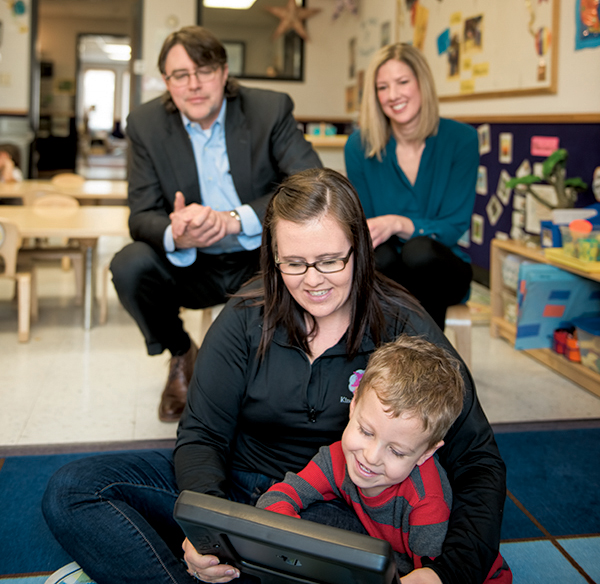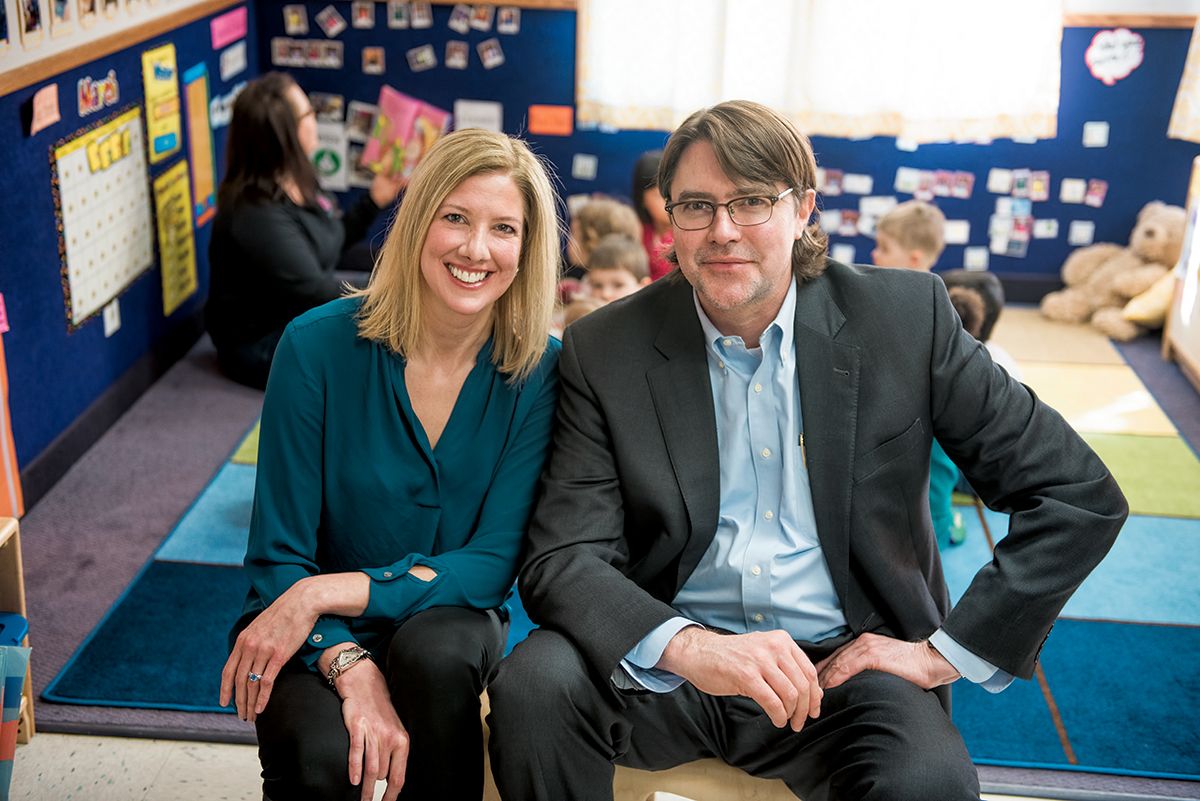Without executive function, we might all be like Sesame Street’s Cookie Monster—living a life of frenzied activity and surrounded by crumbs.
Stephanie Carlson and Phil Zelazo, professors in the Institute of Child Development, know that the ability to control our thoughts, actions, and emotions also allow us to pay attention, listen, and follow directions.
And because the development of self-control is most dramatic in the preschool years, Carlson helped create a segment for Cookie Monster called “Me Want It (But Me Wait).”
Carlson and Zelazo are now the minds behind a new company, Reflection Sciences. Together they are using technology to put a simple tool to assess executive function in the hands of caregivers and teachers.
It’s a powerful way to identify kindergarten readiness as well as signs of such disorders as attention deficit or autism, where early diagnosis can make a world of difference.
Kinderberry Hill Child Development Centers adopted the tool in February.
“There is so much evidence now about the importance of executive function,” says Anne Roy, executive director at the Roseville location. “We want to make sure we do everything we can for our students, so if some students need a little extra help, we can provide that. Our goal is to ensure students are successful in learning and in life.”
Its basis in neuroscience makes Reflection Sciences stand out, as well as its potential for early intervention.
“This has been an eye-opening experience to all the ways to reach the public,” says Zelazo. “Instead of only publishing in a journal to distribute new knowledge, we are putting it into practice immediately, shortening the research-to-application timeline so dramatically.”
All in their families
Carlson and Zelazo have the good luck of different backgrounds. She grew up in a business-oriented family.
“I was the black sheep—the only one not to run a business,” Carlson says. “I felt from a young age that I wanted to be a child psychologist.”
Zelazo grew up in an academic family.
“I got my first citation as an infant,” he quips, “a footnote in one of my parents’ studies published in Science. If anybody had predicted I’d start a business someday, I would have laughed.”
At 10, Carlson was reading Virginia Axline’s Dibs in Search of Self, about how play therapy was used to treat a boy with a form of autism to foster healthy development. At Bucknell University in Pennsylvania she realized she was drawn to research and pursued a Ph.D. at the University of Oregon, studying children’s imaginary companions. Imagination turns out to be an important indicator of executive function.
Meanwhile, Zelazo’s path through college quickly gravitated toward psychology. From McGill University in Montréal he went on to Yale to study neuroscience and cognitive development. Always fascinated by children and learning, as a young researcher he realized a card-sort task developed for adult stroke patients could be adapted to identify early development of executive function in young children.
Carlson and Zelazo were recruited to Minnesota in 2007. The top-ranked Institute of Child Development recognized executive function as a strategic priority for research and hired them both. At ICD, the two found nationally renowned colleagues to challenge them and collaborate with them in an environment that valued making a difference.
Carlson soon adapted Zelazo’s card-sort task to be useful for a broader age and ability range, including children as young as two. It was named the Minnesota Executive Function Scale (MEFS), and its use began to spread.
Today Carlson and Zelazo describe themselves as partners in business and in life, and their work to understand and measure executive function is nothing short of revolutionary.
Fun, easy, and accurate
Children experience MEFS like a game. They’re asked to match shapes or colors, switching from time to time. Games like Simon Says and Blink exercise some of the same skills. In the lab, recent technology as simple as a net cap allows brain activity to be tracked while taking the scale.

As Carlson and Zelazo designed research and studies to continue to test and develop the accuracy and effectiveness of MEFS, they assembled kits to send out to research participants. Then they began getting requests from education organizations based on executive function’s importance for school readiness and its potential for helping underserved children. Demand for the kits soon outstripped their ability to keep up.
“The counting and scoring was a little tricky, so we began to think we should get some digital scoring,” Carlson remembers. “At the same time, not a day would go by without a request for a kit.”
Carlson started working on a digital application. She used the last of some grant funds for a prototype of an iPad version and took that to the U’s Office of Technology Commercialization. She and Zelazo then put up their own savings to fund the real app.
“Deciding to start a business is a very soul-searching process,” says Carlson.
In June 2014 Carlson was on the phone with her father in Massachusetts, talking through some of her options, when he saw someone in the coffee shop that he realized would be a good contact. John Carlson (no relation) had business experience from semiconductors to software to systems change. He’d once headed a national rehabilitation company that served people with brain injuries.
“I had learned so much about brain injuries and so many kinds of learning—for example, I knew that if you are injured in the front of your head it’s the worst—that’s the prefrontal cortex,” he says. “So when Stephanie came along with an objective measure for young children, I could leverage so much knowledge that I already had.”
A phone call was made, light bulbs went on, and John Carlson joined the team as interim chief executive officer. In August 2014, the business took a leap beyond the labs when Reflection Sciences was licensed as a new company.
“We were scrambling,” Stephanie Carlson recalls. “We had 10 elite private schools in Manhattan who needed it by September 1!”
The new app is a tablet game that takes less than five minutes, is easy to use with children two years and up, and is valid and reliable.
A leader for executive function
Today, Reflection Sciences has more than 40 clients in 12 states and the Netherlands. It offers versions in English, Spanish, Dutch, and Mandarin. More than 6,000 children, and counting, have been assessed using MEFS.
Public and private schools as well as early learning centers like Kinderberry Hill are using Reflection Sciences. Each time a child takes the assessment, the de-identified information is added to the data pool, resulting in continuous fine-tuning and improvement.
“We’re trying to start early so we can detect all the learning issues, so kids are not discouraged,” says John Carlson, now chairman of the board. “You don’t just assess but create a baseline and help them.”
Stephanie Carlson has stepped into the role of CEO during an entrepreneurial sabbatical leave provided by the University, while Zelazo is focusing on product development.
“We made the decision to be a for-profit company with a strong social mission,” says Carlson. “We have a real mission to reduce gaps and ensure all children’s access to opportunities. Our focus now is on interventions for those kids most at risk.”
“You read these alarming statistics of diagnoses with attention-deficit disorders or learning disabilities,” says Zelazo, “when it’s likely some of these kids just haven’t had the opportunity yet to develop executive function skills.”
Their mission is rooted in what Zelazo calls the democratic nature of science and the idea of “civic science.” That is why professional development is a growing area.
“By putting tools in the hands of teachers, we are educating them about the development of executive function, too,” he says. “Teachers can then help children practice pausing and reflecting, and behaving in a goal-directed way. These skills in active reflection and flexible thinking are the foundation for learning.
“It’s a great position for the college to be in—helping teachers understand brain development and neural plasticity,” he adds. “The college and the Institute of Child Development can be a leader in promoting and teaching the role of executive function in early learning.”
Learn more about Reflection Sciences and the Institute of Child Development.
Story by Gayla Marty | Photos by Jayme Halbritter | Spring/summer 2016
 Stephanie Carlson and Phil Zelazo
Stephanie Carlson and Phil Zelazo